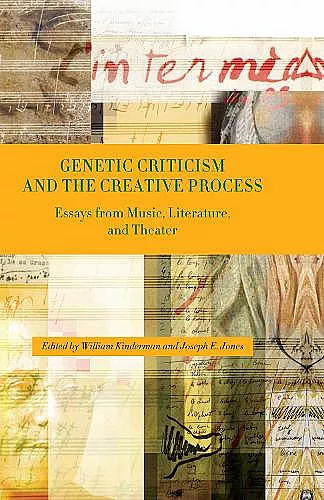Genetic Criticism and the Creative Process
Essays from Music, Literature, and Theater
William Kinderman editor Joseph E Jones editor
Format:Hardback
Publisher:Boydell & Brewer Ltd
Published:1st Dec '09
Currently unavailable, and unfortunately no date known when it will be back

Studies of the genesis of musical, literary, and theatrical works. Not only the final outcome but the process of creative endeavor has long attracted attention in various artistic disciplines, but only recently has the potential of such research been seriously explored. The most rigorous basis for the study of artistic creativity comes not from anecdotal or autobiographical reports, but from original handwritten sketches and drafts and preliminary studies, as well as from revised manuscripts and typescripts, corrected proof sheets, and similar primary sources. The term "genetic criticism" or "critique génétique" relates not to the field of genetics, but to the genesis of works of art, as studied in a broad and inclusive context. The essays inthis volume explore aspects of genetic criticism in an interdisciplinary context, emphasizing music, literature, and theater. A common thread pertains to the essential continuity between a work and its genesis. This volume bringstogether essays from leading scholars on subjects ranging from biblical scholarship to Samuel Beckett, and from Beethoven's Eroica Symphony to very recent musical compositions. Contributors: Nicolas Donin, Daniel Ferrer, Alan Gosman, R. B. Graves, Joseph E. Jones, William Kinderman, Jean-Louis Lebrave, Lewis Lockwood, Geert Lernout, Peter McCallum, Armine Kotin Mortimer, and James L. Zychowicz William Kinderman is Professor of Musicology at the University of Illinois at Urbana-Champaign; Joseph E. Jones is visiting Assistant Professor of Musicology at the University of Illinois at Urbana-Champaign.
Musicologists should certainly find it refreshing to read writers like Geert Lernhout . . . [who write] with such ample reserves of wit and good humour. . . [The various chapters] provide plentiful food for thought. . . Lockwood offers the most eloquent statement about what is, generally, at stake. . . McCallum's . . . is the most persuasively far-reaching contribution. . . . [Donin's chapter] lifts this critical enterprise into a new and even more complex world. -- Arnold Whittall * MUSIC & LETTERS *
[Explores] the plurality of creative endeavor. Music holds a predominant position in these inquiries, with Beethoven at the forefront. In an excellent essay, Lewis Lockwood argues that [Beethoven's sketches] divulge the 'conceptual image,' an original idea of basic shape that served as an anchor for the working out of musical material. * THE BEETHOVEN JOURNAL *
The French school of critique génétique has provided invaluable models for future developments. That coordinated projects among scholars in different disciplines and from different countries are spreading this gospel can only be received with wonder and delight. The insights into musical and literary works that result are bearing immediate fruit and will continue to prove useful to future generations of humanistic scholars. -- Philip Gossett, Robert W. Reneker Distinguished Service Professor of Music, The University of Chicago
Works in the performing arts are by nature 'living art' because no two performances are ever exactly the same. Through detailed documentation, the case studies in this volume demonstrate that genetic criticism [la critique génétique] is ideally suited for analyzing and evaluating works in the performing arts -- music, theater, and film. Reading these penetrating studies, one is reminded of Paul Valéry's remark that a poem is 'never finished, only abandoned. -- William H. Rosar, Editor, The Journal of Film Music
ISBN: 9781580463171
Dimensions: unknown
Weight: 508g
235 pages